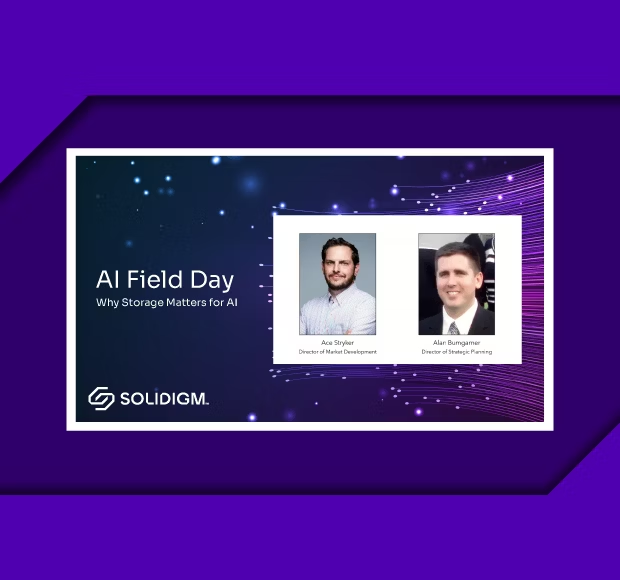AI Field Day 2024
1. Why Storage Matters for AI

In this presentation, Ace Stryker and Alan Bumgarner of Solidigm discuss the importance of storage in AI workloads. They explain that as AI models and datasets grow, efficient and high-performance storage becomes increasingly critical.
In this discussion they cover several key points:
- The growing AI market and the shift from centralized to distributed compute and storage, including at the edge
- The dominance of hard drives for AI data and the opportunity for transitioning to flash storage
- The role of storage in AI workflows, including data ingestion, preparation, training, and inference
- The Total Cost of Ownership (TCO) benefits of SSDs over hard drives, considering factors like power consumption, space, and cooling
- The Solidigm product portfolio, emphasizing different SSDs for various AI tasks, and the importance of choosing the right storage based on workload demands
- A customer case study from Kingsoft in China, which saw a significant reduction in data processing time by moving to an all-flash array
- The future potential of AI and the importance of SSDs in enabling efficient AI computing
The session also includes questions from the Field Day delegates covering technical aspects of Solidigm storage products, such as the role of their cloud storage acceleration layer (CSAL), and they discuss the importance of consulting with customers to understand their specific AI workload requirements for optimal storage solutions.
2. Unlocking Your Data: Optimized Storage to Accelerate Your AI Data Pipeline

Wendell Wenjen, Director of Storage Development for Supermicro, and Paul McLeod, Product Storage Director from Supermicro, discuss challenges and solutions for AI and machine learning data storage highlighting how Solidigm SSDs help meet these challenges and provide solutions.
Supermicro provides servers, storage like the Solidigm D5-P5336, GPU-accelerated servers, and networking solutions, with AI-related applications as a significant portion of their revenue.
In this video, Wendell and Paul highlight the challenges in AI operations and machine learning operations, specifically around data management. This includes collecting data, transforming it, and feeding it into GPU clusters for training and inference. They also emphasize the need for large-capacity of storage to handle the various phases of the AI data pipeline.
Supermicro has a wide range of products that incorporate Solidigm SSDs, designed to cater to each stage of the AI data pipeline, from data ingestion, which requires a large data lake, to the training phase, which requires retaining large amounts of data for model development and validation.
They also discuss the importance of efficient data storage solutions and introduce the concept of an “IO Blender effect,” where multiple data pipelines run concurrently, creating a mix of different IO profiles.
Supermicro delves deeper into storage solutions, highlighting their partnership with WEKA, a software-defined storage company, and how their architecture is optimized for AI workloads. They explain the importance of NVMe flash storage, which can outpace processors, and the challenges of scaling such storage solutions. They also discuss Supermicro’s extensive portfolio of storage servers, ranging from multi-node systems to petascale architectures, designed to accommodate different customer needs.
Supermicro's approach to storage for AI includes a two-tiered solution with flash storage like the Solidigm D5-P5336 for high performance and hard drive-based storage for high capacity at a lower cost. They touch on the role of GPU direct storage in reducing latency and the flexibility of their software-defined storage solutions.
The presentation concludes with an overview of Supermicro's product offerings for different AI and machine learning workloads, from edge devices to large data center storage solutions. Watch the video to glean valuable insights about AI solutions, and how Supermicro, in partnership with companies like Solidigm and WEKA, is expanding the role of AI in the marketplace.
Read the transcript for Unlocking Your Data: Optimized Storage to Accelerate Your AI Data Pipeline.
About the Speakers
Ace Stryker is the Director of Market Development at Solidigm where he focuses on emerging applications for the company’s portfolio of data center storage solutions. A Solidigm employee from day one, he previously worked as a solution architect and technical marketing engineer in Intel's storage and memory group.
Alan Bumgarner holds the position of Director of Strategic Planning for Storage Products in the Solidigm Data Center Products Group. He began his career at Intel Corporation in Folsom, CA more than 20 years ago. Since then his roles have included front line technical support, remote server management of multiple Intel data centers, product/channel/technical marketing, field sales, and strategic product planning and management. These roles took him from California to New Jersey, Texas, and Oregon, and finally back to Folsom, CA. Alan earned a Bachelor of Science in Business Administration Systems from the University of Phoenix. In his free time he enjoys cooking and also likes to ski, bike, hike, and work on cars.
Wendell Wenjen is Director of Storage Development for Supermicro, with Bachelor and Master degrees in electrical engineering from Harvey Mudd College and MBA in marketing from UCLA.
Paul McLeod, Product Storage Director with Supermicro. He has over 15 years working in the enterprise storage industry. Paul’s expertise includes host-based RAID, standalone RAID subsystems, High Availability solutions, NAS Appliance, Storage Servers, Fibre Channel Networks, SAN sharing products like Xsan & StorNext, and traditional Enterprise Backup applications.

